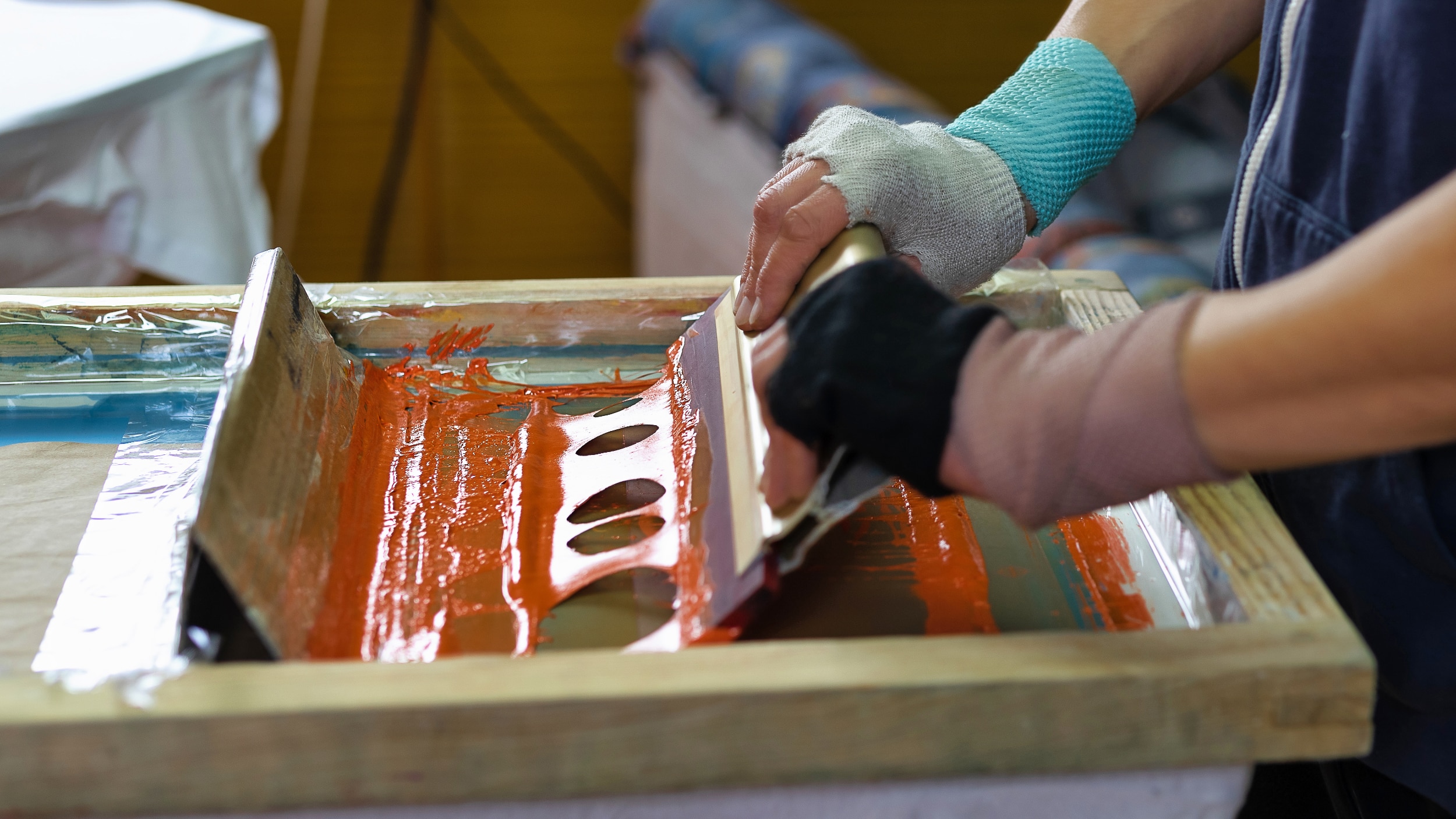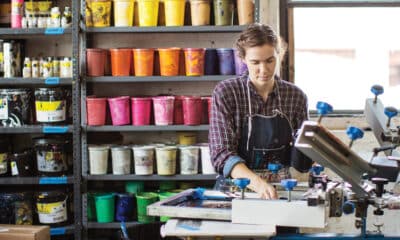
33 Screen Printers Opine on Industry Influencers
Some want to see more, others regard them as a “waste of time.”
Published
5 months agoon
ACCORDING TO MERRIAM-WEBSTER, an influencer is “a person who inspires or guides the actions of others; a person who is able to generate interest in something (such as a consumer product) by posting about it on social media.” But having a steady following does not necessarily make an influencer an expert in their field. Should people trust their opinions based on their social media presence?
We asked the Brain Squad (and one anonymous contributor): “What are your thoughts on influencers promoting products, education, and experience in the screen printing industry?” Here’s what they have to say:
- Paid influencers — those who have received compensation such as free equipment in exchange for content — have less value in terms of “trustability,” as their opinions are often biased. If someone has been compensated for their opinion or content, it should be made very clear to those viewing that content. Platforms such as Instagram have policies in place to enforce this; however, in the screen printing space, there are individuals who do not follow those guidelines. Outside of paid influencers, social media is filled with experts who have little to no experience in screen printing (etc.) or truly running a successful apparel decorating facility. It’s become a major issue in my opinion, as there tends to be more bad information than correct. — Scott Garnett, King Screen
- There needs to be more in our industry! Very few people go beyond showing how to screen print. The audience is so limited compared to educating buyers and consumers on how to work with printers, select products, etc. Suppliers need to tap into influencers more to showcase their products. At the very least, send free product to review/showcase. — Jeremy Picker, AMB3R Creative
- If you have a brand that sells retail, [listening to the right influencers] could be very effective. For the custom apparel business, [this is the case] only if it fits your business model – for example, if you are seeking customers from any part of the country, and particularly if you are focusing on a particular niche group, like bands or overlanders. If you focus on local business maybe an influencer that is smaller but more locally based could work. — Charlie Vetters, Organic Robot Designs
- It’s good as long as it’s done with the right motives and not purely financial. — Shannon Mckinnon, Aisle 6ix
- I think it is a great chance for people who may never have had the chance to be seen to share their expertise. — Ryan McFarland, 641 Apparel
- I think there is a ton of value in influencers. We are behind the curve, as we have not sought out any influencers, but I think an article on this topic might motivate myself and other shops to explore this opportunity. — Jessica Tillery, All Quality Graphics
- Brings more information to the public. — Donald Burch, Burch Creations
- Neutral. Some people promote stuff because they get it for free and want to keep getting it for free. Others promote because they genuinely love it. It’s up to us as consumers to figure out who we trust and why. — Brian Geffen, Duds by Dudes
- Any information promoting screen printing is advantageous. — Robert Francis, ScreenPrintPlus
- I am all for promoting education and experiences with products! — Joe Ortinau, Ortinau Art
- I think anyone who is helping you grow your business is positive. I think having people who are actual experts doing consulting and influencing growth will always help. — Shaun McCarthy, GL Imprinting
- I think it is the way of the future. People will take advice from who they know or who their friends know. — Davis Slagle, Bee Graphix
- Generally a good thing, although the content is something like 99 percent textile (understandably). — Kyle Baker, Baker Prints
- It’s just another lane for advertising. — Keith Abrams, The Decoration Facility
- I am pretty disconnected to the cool happenings of the screen printing industry. In my beginning days I was eager to be influenced by the celebrities of the time, hungry to learn, and wanting to be cutting edge. But now I find myself less interested in the trends and the trend setters. I say more power to them. Influence away! But it’s an awfully loud world and personally, I’m looking for a little quiet. — Matthew Pierrot, GetBOLD
- I think too many screen printing influencers will dilute the pool of good advice. If you influence more, you will be screening less. — Tracey Johnston-Aldworth, Consultant
- Our industry could benefit from publicity from appropriate influencers. — Maude Swearingen Fully Promoted Arbutus
- I think it’s great! In turn, it leads to more business for actual printers. Also, that will lead to a younger generation that will have interest in screen printing. Finally, some younger employable screen printers?! — Sam Lapcevic, Branded Threads
- Experts are different from influencers. Some hold influence with little expertise, and that is a reality we must accept. — Steven Farag, Campus Ink
- This industry is unique because people generally want to help each other learn and grow. It’s a competitive marketplace, but there’s still plenty of room for everyone. It’s cool to see behind the scenes of other shops and share trade secrets. I also think there’s a large market out there of aspiring printers who enjoy watching and learning about the process from professional print shops. Screen printing influencers add value to the wider community and can inspire others to learn the trade. All that said, I try not to take any one shop’s advice, story, or perceived success too closely to heart. There are tons of different ways to approach this business, and many ways to measure success. — Alicia, Borromeo Logowear House
- I believe trust is earned, and I only care what someone says if they can back it up with experience and results. I think experienced folks can tell the difference between useful information and an attempt to cash in on some perceived fame. Luckily, I have only seen what I would consider authentic content on social media in the screen printing realm. I think there are a couple meanings for the word “influencer.” It sometimes has a negative connotation, but in this context, I would define it as someone who has a large influence in their community. It can also mean someone whose sole purpose seems to be creating “content” even if that’s at the expense of the quality of the content. — Ian Graham, Fine Southern Gentlemen
- This will work to a certain point. If the influencer is providing educational value, I think it’s a much stronger way to act. — Eric Solomon, Night Owls
- This is a sensitive subject for me. I see so many “influencers” who do not have a clue about the long-term consequences of what they are promoting or endorsing. I see so many transactional opportunities that are being seized in the moment. I feel very strongly that if you are endorsing something, you had better know it works and what the long-term effects will be. — Mark Coudray, Coudray Growth Tech
- Influencers are a waste of time. They are a modern version of a spokesperson – full of risks that are impossible to control. One mistake on their end, and your business could dry up faster than Lake Mead. — Shamus Barrett , 7 Corners Printing
- I think influencers are great, specifically the ones who are authentic and respected by the community. These folks allow companies to market their products in a tasteful and natural way. All information should be taken in with a grain of salt because influencers could be biased toward certain types of companies and products. Also, behind-the-scenes deals may affect their messaging. I still believe it is a great thing to have representatives who unite the community. — Gavin StGeorges, seps.io
- I think it’s very beneficial to have influencers who focus on education – to be successful you must be an efficient and entertaining communicator. As long as there is a foundation of education and helping to uplift others, I personally see no problem with influencers in the screen printing industry. However, I have noticed an influx of hobby influencers, whom I wouldn’t consider to be a part of the industry. This definitely becomes irritating because potential clients try to take their business to these people. — Elisa Serrano, Don’t Lose Hope Screen Print
- There are influencers who have many years of experience and promote excellent information. Then, there are those who have been at it five years and think they are pros. They promote a lot of misinformation that is taken as gospel because they have a following. — Dee Reeve, The E. B. Wood Group
- There are a lot of voices in the world of screen printing. Some are very knowledgeable, and some are just loud. In a similar vein, there are some names in our industry that have been around for a long time whose processes or thoughts are outdated. — Ryan Toney, P&M Apparel
- I always check it out myself after hearing about any promos from influencers. — Kristin Deutsch, Hair of the Dog Graphics
- I regard “influencers” as suspect much of the time. We are encouraged to believe the number of followers is the primary indicator of the usefulness of the information provided, but it is often just an indication of how hard someone worked to attract “followers.” More importantly, I usually do not find the opinions that are promoted to be especially useful. Occasionally, some sources are very helpful and most appreciated. But in my experience, these are the people who do not care about how many followers they have. — Larry Mays, Mays Marketing Group
- I think it is good that an influencer promotes products as long as they actually use them and aren’t getting paid to say what they think we want to hear. Also, I am not big on influencers who think they know more than the people who have actually been in the trenches for more than 30 years. As long as they have the hands-on experience, I can believe in them. — Al Messier, Team Print
- They are the same as a paid endorsements and an advertising expense. An “influencer” in my opinion, is not always a person regarded as an “expert” w/in their field. They are experts in having followers. — Shawn LaFave, North Georgia Promotion
- Our content is trusted more than content made by the manufacturer. If properly compensated, we have the ability to invest the time and resources necessary to make compelling videos and information. If the person promoting the product has made a profit screen printing whilst using that product, I see that as a valuable recommendation. It’s an example of how someone else could also make a profit using the same product or technique. — Chessie Rosier-Parker, Squeegee and Ink
Why Influencers are Bad for the Industry — By: Anonymous Equipment Supplier
Editor’s note: This response was submitted separately, outside of the Brain Squad. Suppliers and vendors are not Brain Squad members, however, we made an exception here because of the subject matter connection.
In today’s world, social media influencers play a significant role in shaping people’s opinions and influencing their decisions. I don’t like it – not one bit. Whatever happened to the independent investigation of truth, or determining fact from fancy on your own?
I believe paid influencers are a joke with a capital J. The adage, “If you can’t actually do it, then become an influencer and pretend that you could do it,” is salient today. These people are nothing more than posers.
Why is it a mistake to listen to a poser when purchasing screen, DTG, DTF and other products in the garment decorating industry? Because they are getting paid to say what they say, they lack transparency, and their views are one-sided.
Influencers in the garment industry generally are not engineers. They are not experts in machinery design or function. They may have a following on social media, or promote themselves at tradeshows, or have a training school, or have been a printer, but this does not mean they have any expertise or knowledge about the details of various brands of machinery. At best they can say, “I have used this brand and I love it” (which is what they sometimes say).
The Big Joke – the Big Lie, the Big Charade in our industry – is the influencer who pretends not to be paid, but is in fact getting a lot of money to promote a piece of equipment.
Why not just preface their postings with, “I’m getting paid to say this?” Of course, we know why they don’t. And for those influencers who claim to actually believe every word they say, my retort is, “Fine, just be honest and say this is paid content.” But that is not what is happening.
Properly evaluating and selecting the right screen printing equipment is an individual process based on individual needs. An influencer may be able to provide some general information about a particular brand or model, but they typically don’t compare and contrast features like a paid salesperson typically does. You know upfront a manufacturer or supplier is getting paid to promote their own products over their competitors. It’s honest, it’s straightforward, and it’s transparent.
Remember, influencers (posers) are totally biased. They are paid spokespeople who earn a living by promoting products, and this leads to biased reviews and recommendations. Even if an influencer is not being paid directly, they might have a relationship with a particular company that influences their opinions. Frequently they have been provided huge discounts on equipment or given free inks or other products.
Let’s just be truthful. Don’t be fooled by people who have usually failed at their own garment decorating business, and who now earn a living by pretending to be something they are not: honest.
What’s the Brain Squad?
If you’re the owner or top manager of a U.S.screen-printing business, you’re invited to join the Screen Printing Brain Squad. Take one five-minute quiz a month, and you’ll be featured prominently in this magazine, and make your voice heard on key issues affecting screen-print pros. Sign up here.
SPONSORED VIDEO
Let’s Talk About It
Creating a More Diverse and Inclusive Screen Printing Industry
LET’S TALK About It: Part 3 discusses how four screen printers have employed people with disabilities, why you should consider doing the same, the resources that are available, and more. Watch the live webinar, held August 16, moderated by Adrienne Palmer, editor-in-chief, Screen Printing magazine, with panelists Ali Banholzer, Amber Massey, Ryan Moor, and Jed Seifert. The multi-part series is hosted exclusively by ROQ.US and U.N.I.T.E Together. Let’s Talk About It: Part 1 focused on Black, female screen printers and can be watched here; Part 2 focused on the LGBTQ+ community and can be watched here.
You may like
Advertisement

Atlantis Headwear Goes Solar for Sustainable Future

Comfort Colors Announces New Proprietary Dyeing Process Called “Pigment Pure”

10 Production Scheduling Secrets That Will Have Your Team Ready to Rock
Advertisement
Subscribe

Bulletins
Get the most important news and business ideas from Screen Printing magazine's news bulletin.
Advertisement
Most Popular
-

 Case Studies2 months ago
Case Studies2 months agoHigh-Density Inks Help Specialty Printing Take Center Stage
-

 Art, Ad, or Alchemy2 months ago
Art, Ad, or Alchemy2 months agoF&I Printing Is Everywhere!
-

 Andy MacDougall2 months ago
Andy MacDougall2 months agoFunctional and Industrial Printing is EVERYWHERE!
-

 Columns4 weeks ago
Columns4 weeks ago8 Marketing Mistakes Not to Make When Promoting Your Screen Printing Services Online
-

 Editor's Note3 weeks ago
Editor's Note3 weeks agoLivin’ the High Life
-

 Marshall Atkinson3 weeks ago
Marshall Atkinson3 weeks agoHow to Create a Winning Culture in Your Screen-Printing Business
-

 Thomas Trimingham2 months ago
Thomas Trimingham2 months ago“Magic” Marketing for Screen Printing Shops
-

 Case Studies4 weeks ago
Case Studies4 weeks agoScreen Printing for Texture and Depth















